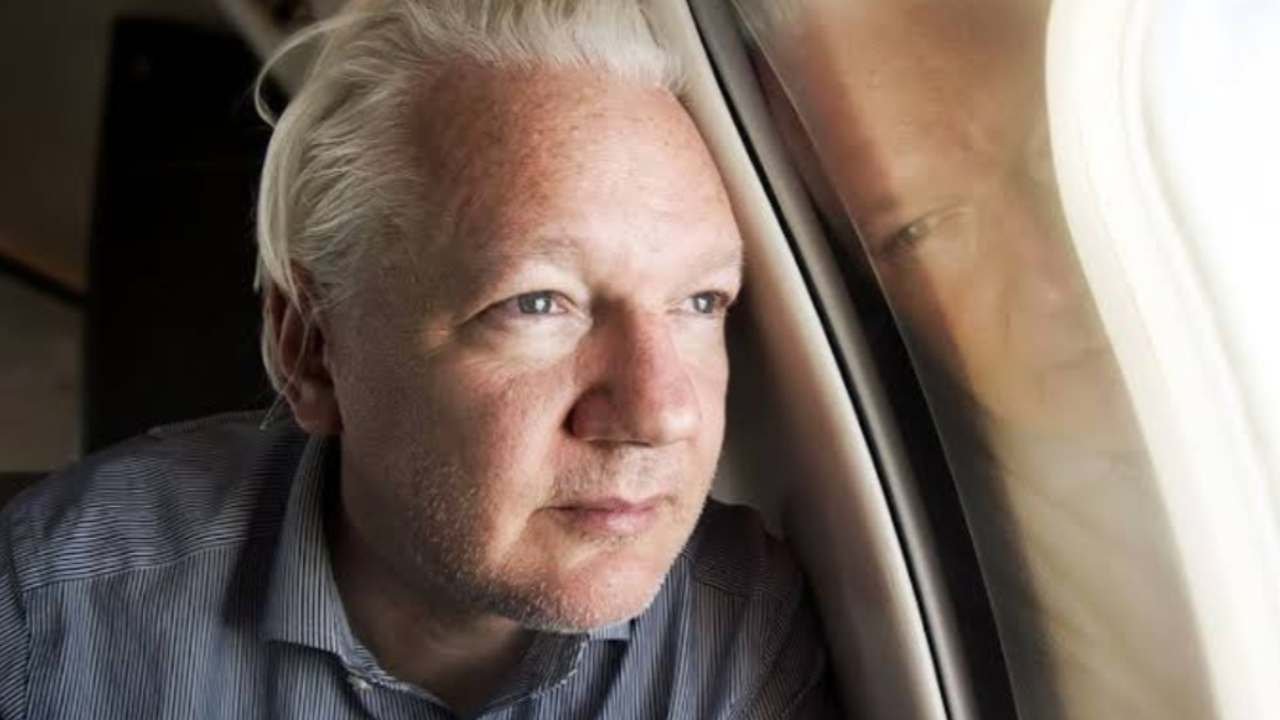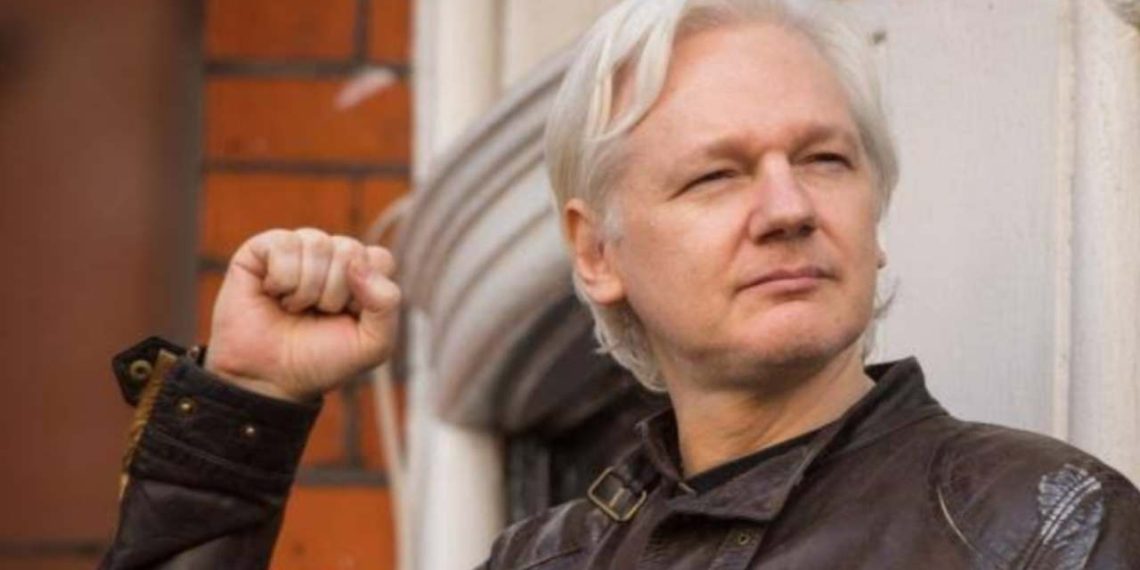WikiLeaks founder Julian Assange has been released from Belmarsh prison and flown out of the UK to the Mariana Islands, where he will plead guilty as part of a deal with the US Justice Department.
Assange, 52, boarded a flight from Stansted airport and is set to appear in federal court later this week. He faces charges of conspiracy to obtain and disclose national defense information.
According to a new DOJ filing, Julian Assange will plead guilty to an Espionage Act charge on Wednesday morning in the Mariana Islands. The proceedings, set for 9am local time in Saipan, will see him sentenced to 62 months of time already served.
The charges relate to the massive release of classified information during Barack Obama’s first term, where Assange allegedly conspired with Chelsea Manning to disclose tens of thousands of reports on the Afghanistan war.
The DOJ filing indicates that the leaked documents also included unfiltered US diplomatic cables, Iraq war-related significant activity reports, and information on Guantanamo Bay detainees, potentially endangering confidential sources.

These leaks occurred between 2009 and 2011 and were shared online through Assange’s WikiLeaks website.
The new deal will allow Julian Assange to avoid imprisonment in the US, as prosecutors will seek a 62-month sentence, equivalent to the time he has already served in Belmarsh prison.
Last month, Assange won the right to appeal an extradition order after his lawyers argued that the US government’s assurances regarding his free speech protections were “blatantly inadequate.”
In a post on X, the WikiLeaks account announced that Julian Assange left Belmarsh prison on Wednesday after 1,901 days and departed from Stansted airport.
“This is the result of a global campaign that spanned grass-roots organisers, press freedom campaigners, legislators and leaders from across the political spectrum, all the way to the United Nations.
This created the space for a long period of negotiations with the US Department of Justice, leading to a deal that has not yet been formally finalised,” the statement read.
“After more than five years in a 2×3 metre cell, isolated 23 hours a day, he will soon reunite with his wife Stella Assange, and their children, who have only known their father from behind bars.”

The statement added:
“WikiLeaks published groundbreaking stories of government corruption and human rights abuses, holding the powerful accountable for their actions.
“As editor-in-chief, Julian paid severely for these principles, and for the people’s right to know. As he returns to Australia, we thank all who stood by us, fought for us, and remained utterly committed in the fight for his freedom. Julian’s freedom is our freedom.”
A video posted on X by WikiLeaks showed Julian Assange dressed in a blue shirt and jeans, signing a document before boarding a private jet marked with the logo of the charter firm VistaJet.
JULIAN ASSANGE IS FREE
Julian Assange is free. He left Belmarsh maximum security prison on the morning of 24 June, after having spent 1901 days there. He was granted bail by the High Court in London and was released at Stansted airport during the afternoon, where he boarded a…
— WikiLeaks (@wikileaks) June 24, 2024
“Julian is free!!!!” his wife, Stella Assange, said in a post on X.
“Words cannot express our immense gratitude to YOU – yes YOU, who have all mobilised for years and years to make this come true.”
Julian is free!!!!
Words cannot express our immense gratitude to YOU- yes YOU, who have all mobilised for years and years to make this come true. THANK YOU. tHANK YOU. THANK YOU.
Follow @WikiLeaks for more info soon…pic.twitter.com/gW4UWCKP44
— Stella Assange #FreeAssangeNOW (@Stella_Assange) June 25, 2024
The plane departed from Stansted on Monday afternoon and was headed to Bangkok, according to FlightRadar24 data. A spokesperson for Assange in Australia declined to comment on his flight plans, and VistaJet did not immediately respond to a request for comment.
The Australian government, led by Prime Minister Anthony Albanese, has been pressing for Assange’s release but declined to comment on the ongoing legal proceedings.
“Prime minister Albanese has been clear – Mr Assange‘s case has dragged on for too long and there is nothing to be gained by his continued incarceration,” a government spokesperson said.
Prior to his incarceration at Belmarsh, Julian Assange took refuge in the Ecuadorian Embassy in London in 2012 and was granted political asylum after English courts ruled he should be extradited to Sweden for a rape investigation.
Julian Assange was arrested by British police in 2019 after Ecuador withdrew his asylum status and was jailed for skipping bail when he first took refuge in the embassy.
Sweden later dropped its sex crimes investigation due to the elapsed time. Assange’s family and supporters have noted that his physical and mental health have suffered significantly during his legal battles.
If approved by a federal judge, the new plea deal would credit his time served, allowing him to return to Australia immediately.
Assange is seen by many as a hero for exposing military misconduct in Iraq and Afghanistan, with WikiLeaks publishing notable files, including a video of a 2007 Apache helicopter attack in Baghdad that killed 11 people, including two Reuters journalists.
However, his reputation has been marred by rape allegations, which he has denied. He was indicted during Donald Trump’s administration over WikiLeaks’ release of secret US documents leaked by Chelsea Manning, who was also prosecuted under the Espionage Act.
The charges against Julian Assange have sparked outrage among his global supporters, who argue that as the publisher of WikiLeaks, he should not be facing charges typically reserved for federal government employees who leak or steal information.
Press freedom advocates strongly contend that criminally charging Assange sets a dangerous precedent and represents a significant threat to free speech rights globally.
“A plea deal would avert the worst-case scenario for press freedom, but this deal contemplates that Assange will have served five years in prison for activities that journalists engage in every day,” said Jameel Jaffer, executive director of free speech organisation Knight First Amendment Institute at Columbia University.
“It will cast a long shadow over the most important kinds of journalism, not just in this country but around the world.”
The plea agreement for Julian Assange comes several months after President Joe Biden indicated he was considering a request from Australia to drop the US efforts to prosecute him.
Chelsea Manning, who leaked classified documents to WikiLeaks, was sentenced to 35 years in prison under the Espionage Act and other charges.
Her sentence was commuted by President Obama in 2017, leading to her release after serving approximately seven years in prison.




